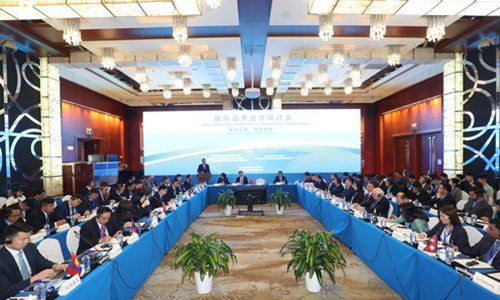HOME >> OPINION
Big-picture thinking needed to resolve border dispute
By Guo Xuetang Source:Global Times Published: 2019/11/6 21:38:40

The first International Conference on Boundary Cooperation is held from October 29 to 30 in Beijing. Photo:fmprc.gov.cn
Sporadic flare ups at disputed borders notwithstanding, the world as a whole seems to be a peaceful place. The first International Conference on Boundary Cooperation that closed on October 30 in Beijing saw around 100 participants from 14 countries brainstorm the issue of border security amid regional security hotspots that often see rising tensions.
Border disputes are mostly triggered by the inherent contradictions between sovereignty and regional stability as well as big power competition brought about by US strategic moves.
Developing countries with border issues are facing severe challenges, as development requires regional security, stability on the international boundary, and cooperation between countries over border issues.
Protecting sovereignty has been an eternal theme in international politics. Some countries have resorted to force to defend sovereignty and territorial integrity, thus border frictions or even wars have occasionally taken place. There is no lack of such cases in East Asia, South Asia, Middle East, Central Asia, Southern Europe, and Latin America.
Peace and development remain the themes of our times. China and many other developing countries are eager to see global stability and hope to achieve development.
"History and practice have proved that a closed, backward and confrontational border is often a hotbed of humanitarian crises, terrorism, transnational crimes and even war," said China's Vice Foreign Minister Luo Zhaohui at the conference. "To build a border of peace, friendship and cooperation is not only the objective need of development of all countries, but also the common aspiration of all countries in the region."
The reason why China-proposed Belt and Road Initiative (BRI) has received extensive response is that countries along the route are well aware that the BRI can bring peace and stability, and opportunities for development.
In contrast, the US defines China as a "strategic competitor," which will inevitably lead to instability in those countries and regions. And such instability might be manifested in border disputes. For those countries having border disputes with others, tackling the contradiction between "defending rights" and "maintaining stability" is a strategic challenge.
First, we must understand and solve the issue from a strategic angle. Every country needs a stable international environment and a peaceful neighborhood to develop its domestic economy and build national strength. Only in this way can a country continue to deepen reform and opening-up, attract foreign investment, promote border trade, tourism and people-to-people contacts, and achieve sustainable development.
The inherent contradiction between sovereignty and regional stability is not insurmountable. The key lies in mutual trust and mutual compromise between countries. Hardly can border disputes be solved without concessions, and regional stability requires the joint efforts of both parties. As long as there is a desire for reconciliation and peace, a balance can be found between the two.
Second, we must follow two principles: big-picture thinking and flexibility. Since the founding of the People's Republic of China in 1949, the country has been committed to building unambiguous, stable and secure borders. China has resolved border issues with 12 neighbors through peaceful negotiations. The two principles have played a key role.
Big-picture thinking means we have to show sincerity toward resolving contradictions from the perspective of border cooperation and regional stability. Flexibility implies that the problems can be resolved either as a whole or one by one.
The Chinese government is still adhering to the principles to deal with border disputes with India and Bhutan, and hopes to receive positive responses from the two countries.
India's position on border disputes such as that in Kashmir is rather rigid, unfavorable for not only maintaining peace and stability in South Asia, but also for developing its economy.
Third, China's experience in dealing with border conflicts is worth learning for other countries. China has so far peacefully resolved border issues with 12 neighbors, which is a contribution to regional and even world peace, and an strong impetus to China's own development.
It is precisely because of China's efforts to resolve most border issues through diplomatic means and to establish long-term, stable, good-neighborly relations that such great achievements can be made.
Many developing countries share similar conditions with China. A proper solution to contradictions between "defending rights" and "maintaining stability" is undoubtedly a win-win diplomatic choice.
Appropriately dealing with border issues will contribute to national security, development, and regional peace. For developing countries, border issues are not only a strategic challenge, but will also bring development opportunities if addressed correctly.
The author is the director of Center for South Asia and Indian Ocean Studies, Shanghai University of International Business and Economics. opinion@globaltimes.com.cn
RELATED ARTICLES:
Posted in: VIEWPOINT